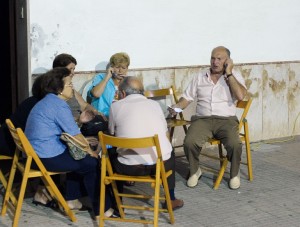This term I have been given free hands to design a privacy course for the Communication Department at UMass Boston – And I am VERY excited about it. Here is a first draft of the syllabus. If you are student at UMass and interested in taking the course please contact me.
WEEK 1: Privacy as Human Right Legislating Privacy (law & convention)
Wed, 9 Sep Introduction
Fri, 11 Sep Read Warren & Brandeis, ‘The Right to Privacy’, Harvard Law Review 1890-4(1), pp. 193-220.
Watch Glenn Greenwald: Why privacy matters (2014) TED Talk https://youtu.be/pcSlowAhvUk
Watch Alessandro Acquisti: Why privacy matters (2013) TED Talk https://youtu.be/H_pqhMO3ZSY
Write: Considering our technology use: Are W&B relevant today?
WEEK 2: Privacy vs Security
Eric Schmidt, the CEO of Google, said “If you have something that you don’t want anyone to know, maybe you shouldn’t be doing it in the first place”
Mon, 14 Sep Discussion Why Privacy Matters
Wed, 16 Sep The Nothing to Hide Argument
Fri, 18 Sep Watch The Hidden History of Privacy – Jill Lepore The New Yorker Festival 2013. https://youtu.be/zuth-_rppKM
Watch Daniel Solove: Nothing to Hide, Nothing to Fear? https://youtu.be/FqJ8EMwj7zY
Read: Solove, D. (2005) “The Digital Person and the Future of Privacy” in Privacy and Identity: The Promise and Perils of a Technological Age (Strandburg, ed.) http://docs.law.gwu.edu/facweb/dsolove/Digital-Person/text/Digital-Person-CH3.pdf
Read: Schneier, B. (2009) “Is aviation security mostly for show?” CNN, December 29. http://edition.cnn.com/2009/OPINION/12/29/schneier.air.travel.security.theater/
WEEK 3: Spatial Privacy
Mon, 21 Sep Discussion Privacy & Security: Bentham, Foucault and theatre of the absurd.
Wed, 23 Sep Panopticon: Is surveillance a deterrent?
Fri, 25 Sep Read: Who’s Watching? Video Camera Surveillance in New York City and the need for Public Oversight. A Special Report by the New York Civil Liberties Union FALL 2006 http://www.nyclu.org/pdfs/surveillance_cams_report_121306.pdf
Write: There have been calls for police officers to carry body cameras. Discuss any privacy issues that could arise from this technology.
WEEK 4: Individual Rights and the Police
Mon, 28 Sep Discussion: police surveillance
Wed, 30 Sep Privacy and the 1st 4th & 5th amendments
Fri, 2 Oct Read: Center for Constitutional Rights, Stop and Frisk – The Human Impact Report July 2012. http://stopandfrisk.org/the-human-impact-report.pdf
Read: Lippman, M. (2014) “Searches and Seizures”, Criminal Procedure 2nd ed. https://us.sagepub.com/sites/default/files/upm-binaries/53702_Lippman_Ch3.pdf
Read: You Have the Right to Remain Silent National Lawyer Guild https://www.nlg.org/sites/default/files/KYR-English-web1.pdf
Week 5: Surveillance Technologies in the wild
Ryan Calo “Robot-Sized gaps in surveillance law” in Rotenberg
Mon, 5 Oct —
Wed, 7 Oct From CCTV to Drones: Private Surveillance & Function creep
Fri, 9 Oct Read: McNeal, G. Drones and Aerial Surveillance: Considerations For Legislators. November 2014. http://www.brookings.edu/~/media/Research/Files/Reports/2014/10/drones%20aerial%20surveillance%20legislators/Drones_Aerial_Surveillance_McNeal_FINAL.pdf
Read: Thompson, R. M. (2013) Drones in Domestic Surveillance Operations: Fourth Amendment Implications and Legislative Responses CRS Report for Congress April 3. https://www.fas.org/sgp/crs/natsec/R42701.pdf
Write:
Week 6: Tracking Devices “its only metadata”
Mon, 12 Oct CLOSED
Wed, 14 Oct End of Culture? What your library says about you. Smartphones & Tablets: Did you read the license?
Fri, 16 Oct CLOSED
Watch: Malte Spitz “Your Phone Company is Watching” TED Talk http://www.ted.com/talks/malte_spitz_your_phone_company_is_watching?language=en
Week 7: The Internet, Web & Social Media
Mon, 19 Oct Does the Internet Spell End of Privacy?
Wed, 21 Oct Watch: Citizenfour (Poitras, 2014)
Fri, 23 Oct Watch: “The NSA, Snowden, and Surveillance” (CRCS Lunch Seminar) – Bruce Schneier talk https://youtu.be/3apzxHAA8mI
Write:
Week 8: The Internet, Web & Social Media continued
Mon, 26 Oct Watch: Last Week Tonight With John Oliver – Edward Snowden Interview https://youtu.be/0zg7_4AMXGs
Watch: Terms and Conditions May Apply (Hoback, 2013)
Wed, 28 Oct Sleepwalking, Convenience and Terms of Service
Fri, 30 Oct Watch Do Not Track is a personalized documentary series about privacy and the web economy. https://donottrack-doc.com/en/intro/
Week 9: The Right to Hide?
Mon, 2 Nov Discussion: Social Media Privacy
Wed, 4 Nov Anonymity & Pseudonymity: Encryption & Masked protest.
Fri, 6 Nov Read: Coleman, G. (2013) Anonymous in Context: The Politics and Power behind the Mask CIGI Internet Governance Papers. https://www.cigionline.org/sites/default/files/no3_8.pdf
Write:
Week 10: Identity, Privacy & the right to be forgotten?
Mon, 9 Nov Google vs Europe & the right to be forgotten
Wed, 11 Nov CLOSED
Fri, 13 Nov Read: European Commission: Factsheet on the “Right to be Forgotten” ruling (C-131/12) https://youtu.be/r-ERajkMXw0
Read: European Commission: Myth-Busting The Court of Justice of the EU and the “Right to be Forgotten” http://ec.europa.eu/justice/data-protection/files/factsheets/factsheet_rtbf_mythbusting_en.pdf
Watch: Last Week Tonight with John Oliver: Right To Be Forgotten (HBO) https://youtu.be/r-ERajkMXw0
Watch: Viktor Mayer-Schönberger presents “Delete: The Virtue of Forgetting in the Digital Age Berkman Center https://www.youtube.com/watch?v=XwxVA0UMwLY
Week 11: The Private Body: From fingerprints to DNA
Mon, 16 Nov Genetics and law enforcement
Wed, 18 Nov Is genetic privacy possible?
Fri, 20 Nov Read: Stewart, J. & Thy Tran, D. (2007) “The Ethics of Genetic Screening” in The ethical imperative in the context of evolving technologies (Bassick ed)
http://www.ethicapublishing.com/ethical/3CH1.pdf
Read: Rothstein, M. “Keeping Your Genes Private”, Scientific American. September 2008. https://www.mcdb.ucla.edu/Research/Goldberg/HC70A_W12/pdf/keepyourgenesprivate.pdf
Read: Oscapella, E. (2012) Genetic Privacy and Discrimination: An Overview of Selected Major Issues. BC Civil Liberties Association https://bccla.org/wp-content/uploads/2012/03/2012-BCCLA-Report-Genetic-Privacy1.pdf
Read: Prabhakar, S. et al (2003) “Biometric Recognition: Security and Privacy Concerns”, IEEE Security & Privacy http://biometrics.cse.msu.edu/Publications/GeneralBiometrics/PrabhakarPankantiJain_BiometricSecurityPrivacy_SPM03.pdf
Watch: Whose DNA is it anyway? Wendy Bonython at TEDxCanberraWomen https://www.youtube.com/watch?v=pLvtv2iYv4Y
Write:
Week 12: Bodies of technology
Mon, 23 Nov Selfies, Sexting, & Nonconsensual pornography (Revenge Porn)
Wed, 25 Nov Gamification, Health apps, & User Data
Fri, 27 Nov EXERCISE?
Week 13: Big data, algorithms & identity
Mon, 30 Nov Defining your identity: data or choice?
Wed, 2 Dec Watch: Viktor Mayer-Schonberger and Kenneth Cukier, “BIG DATA: A Revolution That Will Transform How We Live, Work, and Think” https://www.youtube.com/watch?v=bYS_4CWu3y8
Fri, 4 Dec Watch: Eli Pariser “The Filter Bubble” TED Talk http://www.ted.com/talks/eli_pariser_beware_online_filter_bubbles?language=en
Listen: Joseph Turow “How Companies Are ‘Defining Your Worth’ Online” Fresh Air. http://www.npr.org/2012/02/22/147189154/how-companies-are-defining-your-worth-online
Week 14: Looking elsewhere for solutions
Mon, 7 Dec Subversion: Sousveillance, body cams, and masked demonstrators
Wed, 9 Dec Privacy through Copyright
Fri, 11 Dec Write: Are body cams a solution? Strengths & Weaknesses.
Week 15: The Future of Privacy
Mon, 14 Dec Discussion – Where is privacy going?
Read Lee Rainie and Janna Anderson “The Future of Privacy” Pew Research Center http://www.pewinternet.org/2014/12/18/future-of-privacy/



